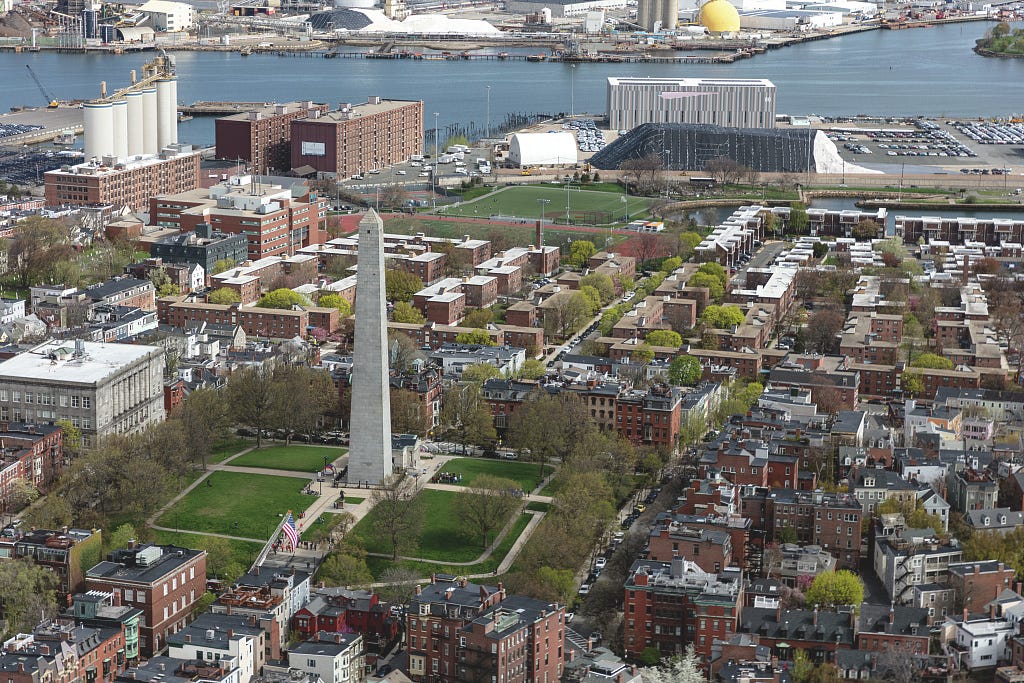
This is an installment of “Sestercenntenial Moments,” marking the 250th anniversary of the American Revolution and its memory in our national life. For more on the background of the series, see here.
This week marks the 250th anniversary of the Battle of Bunker Hill—one of the pivotal battles of the American Revolution. In particular, what happened on June 16, 1775, captures my imagination as I reflect on the event and the dazzling audacity of the people who precipitated it.
Just a quick reminder: On April 19, 1775, the Massachusetts Minutemen had engaged regular British troops at the Battles of Lexington and Concord. (I’m delighted to say my granddaughter was born on the 250th anniversary of the official opening of the American Revolution.) The two engagements were the culmination of years of tension in the colony, and their aftermath in the wake of an ignominious British retreat from Concord to Boston, heightened it still further. The colonists chafed under martial law, while the army under the leadership of Governor/General Thomas Gage was literally besieged. Down in Philadelphia, the Second Continental Congress had named George Washington as the commander of what was to be a trans-colonial Continental Army, and in mid-June he was on his way to setting up his headquarters in Cambridge to take over what was still a largely New England force. For the time being, the Minutemen were on their own.
Boston at that time was a peninsula with a narrow neck, surrounded by islands and a jagged coastline to the north and south of it. To the south was Dorchester Heights, site of a future Washington triumph in seizing ground that would force the British from Massachusetts altogether. But on June 17, a Minuteman commander named William Prescott (his grandson, also William Prescott, became a historian for whom the town in Arizona is named) led 1200 troops onto another peninsula north of Boston, Charleston, and fortified a position known as Breed’s Hill. This was a brilliant maneuver, both for its speed and strategic position, because it allowed colonial artillery to bombard the British across the Charles River. (You can see how this could have happened vividly when you stand on nearby Bunker Hill, erroneously considered the main site of the battle, to this day.) When Gage woke up on the morning of June 17, he instantly saw that the rebels posed a mortal threat to his army: that position must be taken.
And it was. But it took multiple tries, culminating in the eventual American abandonment of nearby Bunker Hill, in one of the bloodiest encounters of the Revolution. As such, it could be counted as a British victory. But as the future commander of the British Army, Henry Clinton, who was there for the fight, famously said, "A few more such victories would have shortly put an end to British dominion in America."
The British would remain in Massachusetts for another nine months—nine months that imposed deprivation, sickness, and general misery for all involved. But the events preceding and following the Battle of Bunker Hill provide eloquent testimony of the determination of an exceptionally talented class of leaders and followers who took on the greatest empire in the world in the name of independence. That determination, in turn, led that empire to create the largest invasion force the western hemisphere had ever seen to crush the widening insurgency once and for all. But when that armada arrived, it would not be in Massachusetts, but instead the more promising terrain of New York (which the British would occupy for the entirety of the conflict). And New England? New England was lost for good. For good.



/Users/douglyons/Desktop/culloden house hotel.jpeg. With Scottish heritage, I remain proud of the courage of the rag-tag Scots at the Battle of Culloden. Here is the Culloden House, steps from the battlefield. Bonny Prince Charlie hid here during the battle. Now a hotel. With lots of history.